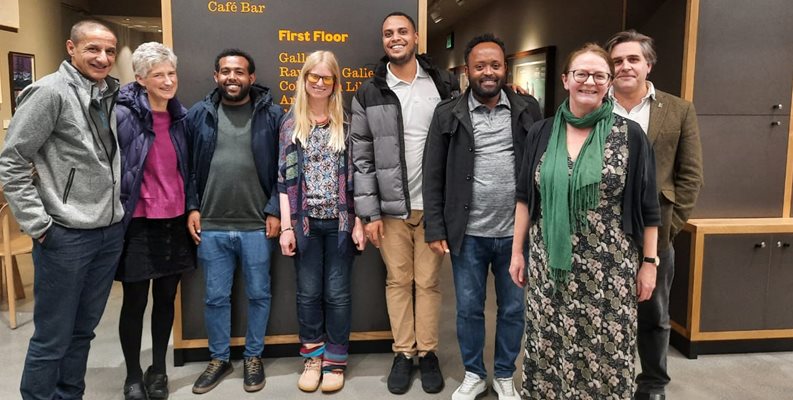On 8 November, researchers from BSMS ran a general public film screening and Q&A at the Towner Art Gallery Cinema in Eastbourne, called The Social Itch. The event, led by Gem Aellah from Global Health and Infection at BSMS, was funded by small grant from the Economic and Social Research Council (ESRC) Festival of Social Science. It explored how film and social science can be used to better understand the multi-layered meanings of disease and disease outbreaks.
Through experimental docudrama film, it offered a close, intimate insight into the lives of people suffering from scabies in a UK Care home and in a rural community in Ethiopia. Scabies is an age-old disease – an infestation by the tiny parasitic mite Sarcoptes scabiei and occurs worldwide. Simple, effective treatment exists, yet outbreaks persist, especially affecting vulnerable and marginalised communities where it causes considerable distress and devastating secondary infections.

Researchers from BSMS were in attendance at the event.
The event spoke to the festival’s theme of ‘My Local Place’ by focusing on a topic that is of high relevance to coastal towns, like Eastbourne, which experiences localised scabies outbreaks but also encouraged the audience to take an anthropological perspective by making their own contrasts and comparisons with the lived experience of scabies in other concrete places.
“Scabies is treatable, but hard to get rid of,” explained Professor Jackie Cassell, Deputy Dean of Brighton and Sussex Medical School (BSMS). “When I started working on scabies outbreaks in care homes some of my colleagues thought it was a weird, marginal interest. Now with Covid-19 everyone is realising this and other infections are a big deal in care homes for older people, many of whom are near the end of life.”
Jo Middleton, a disease ecologist at BSMS added “Here at BSMS we studied the scabies outbreaks in local care homes for older adults and showed it usually takes a long time for staff to realise an outbreak is happening. This may be because it is harder to recognise in people with dementia, in particular. We also showed what a difficult experience this is for homes, and the support they need in early recognition and rapid treatment.
“Scabies at the Manston Migrant Reception Centre is in the news at the moment, but is not at all surprising. Research done by a BSMS student shows that scabies is extremely common and hard to control in migrant and refugee accommodation across Europe, due to the living conditions.”
Audience members included healthcare workers, nursing students, climate activists, and volunteers with a local refugee charity. They watched two films, introduced by those involved in their making, also available online: The Agony of the Night and Within A Forest Dark. Jackie Cassell, Jo Middleton, Addisu Tsegaye Dereje Wonde from BSMS and Ed Hughes from Sussex then took questions from the audience.
Find out more about scabies research aT BSMS here >